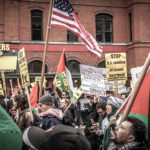By Bernard Bohbot

“The Left’s Jewish Problem” is an essential read for those who want to understand how the UK emerged into the hotbed of Western anti-Zionism that it is today. Basing himself on his doctoral dissertation, Dave Rich sought to understand and explain the pro-Palestinian shift of the British left, a process that slowly developed between the late 1960s and the early 1980s. How accurate, though, is it to refer to this shift as “pro-Palestinian” given that this far left movement is more interested in dismantling the State of Israel, than in creating a Palestinian State existing in peace alongside Israel? Rich points out a peculiar characteristic of this “pro-Palestinian” stance — the adoption of antisemitic stereotypes that are unwittingly attributed to Israel, yet without bearing any grudge against Jews. He calls this phenomenon “antisemitism without antisemites’’. (p.250)
Why is Israel singled out by the far left? In answering this question, Rich distinguishes between the ‘’Old Left” of the 1930s-40s and the ‘’New Left’’ of the 1960s-70s. The Old Left saw the Jews as a downtrodden people and the creation of Israel as just. Many Westerners were also attracted to its democratic socialism. So much so, that in 1955, the left-wing Tribune bluntly asserted, “The cause of Israel is the cause of democratic socialism.” (p.5) The 60s generation grew up in a different social environment. For that generation, the struggle against fascism was that of the WWII generation, and not theirs. As well, class warfare, as advocated by Marx, failed to bring about the social upheaval necessary for asocialist revolution. Hence, the new generation of radical leftists looked for a substitute proletariat. Because the New Left evolved during the decolonization era, Third World nations that had successfully won their independence came to replace the British working class as revolutionary heroes. It was on them that the new Left now placed their hopes.
Given the political divide of the time – the Capitalist West vs. the Third World – Israel was now seen as on the wrong side of history: a “white” enclave grafted onto the indigenous Arab world, similar to the apartheid regime in South Africa or the colonial regime in Rhodesia. (Ironically, up until the Holocaust, antisemites justified their rejection of the Jews by claiming that they were not Whites!) According to Israeli historian Shulamit Volkov, to these revolutionaries, the Jews embodied the hated West. The UK’s New Left did not produce all this anti-Zionist rhetoric itself. It was borrowed mainly from Soviet propaganda. According to Rich, the first occurrences took place in Eastern Europe in the early 1950s when communist authorities accused Marxists of Jewish descent of taking part in Zionist conspiracies to prosecute them. Tropes traditionally attributed to Jews (killing of innocents, conspiracies against non-Jews, dual loyalty) were now used against ‘’Zionists.’’
By the 1980s, the overlap between anti-Zionism and antisemitic rhetoric became more pronounced. Lenni Brenner’s 1984 book “Zionism in the Age of the Dictators” was a favorite read among far-left anti-Zionists, despite its thematic lunacy. The book accused Zionists of complicity in the Holocaust to assuage Western guilt. According to Brenner, aguilt-ridden West was more likely to advance and accept the creation of a Jewish state in Palestine.Within this context, and with the development of identity politics in the 1980s, the far left found a new ally: Islamists. After all, only radical Islam, the reasoning went, continued to fight the Capitalist West after the collapse of communism. Islamism now replaced the Third World as representative of the oppressed.
Heirs to this mindset, far leftists such as Jeremy Corbyn (the current head of the Labour Party) and Ken Livingstone (the former Mayor of London) today endorse Hezbollah and Hamas and other prominent Islamist figures such as Sheikh Yusuf al Qaradawi, the Egyptian-born head of the Doha-based International Union of Muslim Scholars. In 2018, an Egyptian court sentenced Sheikh Qaradawi among others to life behind bars in absentia for alleged acts of violence that included the murder of a police officer.The extent of Dave Rich’s research is impressive. He tackles a difficult topic without resorting to polemical attacks. He fails, though, to answer the primary question: Is anti-Zionism (when it calls for the dismantling of Israel) antisemitic? Instead, he neatly bypasses the question by illustrating how those fighting for the demise of the Jewish state tend to use antisemitic tropes, as well as refuse to recognize the Jews’ right to define their collective identity within their nation-state. Herein, he argues, lies the essence of the far left’s Jewish problem

